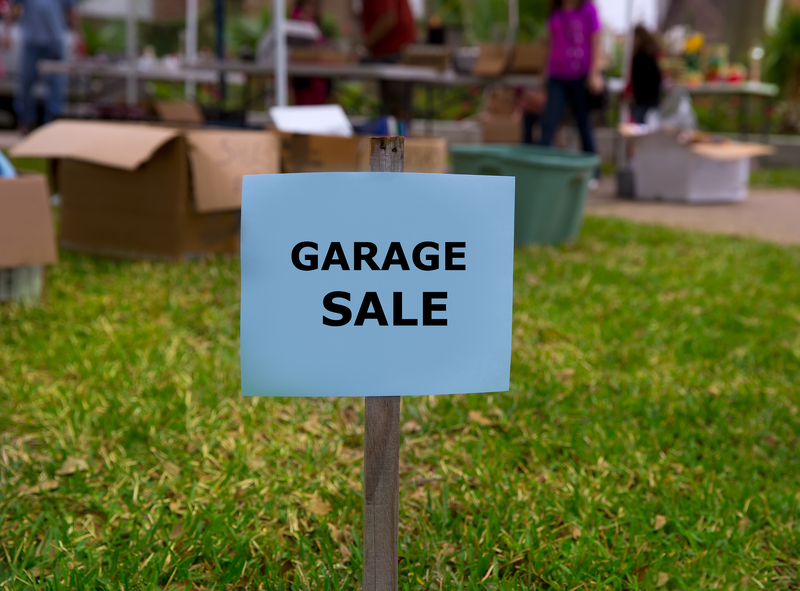Where and How to Recycle Used Pots and Pans Near You
Recycling old and unused cookware--such as pots and pans--is a critical step in reducing waste and conserving resources. If you're wondering where and how to recycle used pots and pans near you, you're making a responsible choice! Whether your pans are scratched, missing handles, or you simply need an upgrade, this comprehensive guide will help you find the best options to dispose of or repurpose your old cookware in an eco-friendly way.
Why Should You Recycle Old Pots and Pans?
Cooking pots and pans are often made with metals such as aluminum, stainless steel, copper, or cast iron, which are recyclable materials. Recycling used cookware instead of sending it to a landfill helps:
- Reduce landfill waste.
- Conserve natural resources by reusing existing metals.
- Lower the energy demand needed to mine and refine new materials.
- Minimize environmental pollution.
But--can you throw pans in the recycling bin? Not always. Let's explore where and how you can recycle used pots and pans near you.

Understanding Cookware Recycling: Materials Matter
Before recycling your old pots and pans, it's essential to understand their materials. Here's a quick breakdown:
- Aluminum - Lightweight and rust-resistant, commonly found in bakeware and frying pans.
- Stainless Steel - Durable and heavy, used in premium cookware and stockpots.
- Cast Iron - Hefty and long-lasting, great for skillets and Dutch ovens.
- Copper - Excellent heat conductor, but usually lined with tin or stainless steel.
- Nonstick/Coated Cookware - Features layers of Teflon or ceramic coatings, which may complicate recycling.
Generally, metal pots and pans are recyclable, but nonstick coatings and plastic handles may present challenges. Read on to learn local options and alternative methods.
Where to Recycle Used Pots and Pans Near You
1. Curbside Recycling Programs
Most municipal curbside recycling programs do not accept old cookware, especially those with nonstick coatings or plastic/rubber handles. However, some cities allow all-metal cookware--if you remove plastic parts first. Always check your local recycling guidelines by visiting your city or county's waste management website.
2. Local Scrap Metal Yards
Scrap metal recycling centers are among the best places to recycle old pots and pans. These facilities accept most *metal cookware*, regardless of surface damage, as long as they contain mostly metal. Here's how to find and use them:
- Search online for "scrap metal recycling near me" or "metal recycling centers."
- Call ahead to check which types of cookware they accept (aluminum, stainless steel, cast iron, etc.).
- Remove any non-metal parts such as plastic or wood handles, lids with glass, or rubber grips.
- Drop-off your items during business hours. Many centers even pay you a small amount for scrap metal.
3. Household Waste Recycling Centers (HWRCs)
Many communities offer household waste recycling centers or recycling depots that accept a wide range of recyclable items, including cookware. These centers usually have bins for ferrous (iron-based) and non-ferrous metals. You can locate your nearest HWRC by searching your municipality's website.
4. Big-Box Retailers and Take-Back Programs
Some large retailers--such as Target, IKEA or Best Buy--occasionally host special recycling events or offer cookware recycling programs. Additionally, brands like Calphalon and GreenPan have take-back programs for their products.
- Check the manufacturer's website for mail-in recycling programs.
- Look for national recycling events or local collection drives.
- Participate in retailer-sponsored sustainability initiatives.
5. Donation and Reuse Options
If your used pots and pans are still functional, consider donating rather than recycling:
- Local thrift stores (Goodwill, Salvation Army, Habitat for Humanity ReStore)
- Soup kitchens, shelters, or community centers
- Posting on neighborhood swaps or online marketplaces such as Freecycle, Craigslist, or Facebook Marketplace
Donating extends the lifespan of your cookware and helps people in need.
6. Specialized Recycling Companies
For items that are not accepted at scrap yards or curbside, consider companies specializing in hard-to-recycle goods, like TerraCycle or local recycling businesses. Some charge a small fee, but they offer a responsible option for nonstick-coated and mixed-material cookware.
How to Prepare Used Pots and Pans for Recycling
Proper preparation ensures your cookware is accepted for recycling:
- Clean Thoroughly: Remove all food, grease, and debris.
- Remove Non-Metal Parts: Take off plastic/rubber handles, glass lids, or knobs.
- Separate Materials: Group cookware by metal type if required by the recycling facility.
- Disassemble Multi-Part Items: If possible, separate pans from lids, inserts, or accessories.
*Hint:* Cast iron pans are usually accepted as-is, but with lighter aluminum ones, facilities may require handles removed.
Alternative Ways to Repurpose Old Pots and Pans
If your local recycling options are limited, consider giving those *unwanted pots and pans* a new life by repurposing them:
- Garden Planters: Drill holes for drainage, fill with soil, and use as creative outdoor plant pots.
- Craft Projects: Use pans as painting canvases, wall organizers, or unique clocks.
- Storage or Utility: Store tools, art supplies, or small household items.
- Pet Food Bowls: Thoroughly clean and use as bowls for pets or wildlife feeders.
With some imagination, your old cookware can avoid the landfill and transform into something useful or decorative.
Which Cookware Should Not Be Placed in Your Bin?
Not all pots and pans can be tossed in your home recycling bin. Here's why:
- Nonstick-Coated Cookware: Nonstick surfaces like Teflon complicate recycling. Unless the coating is fully removed or accepted by a specialty program, avoid curbside bins.
- Cookware with Plastic, Rubber, or Glass: Handles, knobs, or lids made of other materials are rejected by standard recyclers.
- Mixed-Material Items: Pans incorporating different metals, or those fused with ceramic/glass, may be difficult to recycle using traditional methods.
*When in doubt, call your local recycling center before disposing of these types of cookware.*
Frequently Asked Questions (FAQ) About Pots and Pans Recycling
Can all old cookware be recycled?
Most metal pots and pans can be recycled if you remove any non-metal parts. Nonstick, ceramic-coated, or heavily damaged pans need special handling.
How can I find a recycling center near me?
You can search online using terms like "kitchenware recycling near me" or "cookware recycling center". Your city or county waste management website also lists local options.
Does Goodwill accept used pots and pans?
Yes, as long as they're still in usable condition. Check with your local branch for any restrictions. Broken or heavily worn cookware usually isn't accepted for donation.
Can cast iron pans be recycled?
Absolutely. Cast iron is a highly valuable recyclable metal. Take to a scrap metal recycler or repurpose at home.
What should I do with nonstick pans?
If the coating is damaged, most curbside programs won't accept them. Look for store-based recycling events or speciality mail-in programs.
How do I dispose of pots and pans with wooden handles?
Remove the wooden handles before recycling; compost or dispose of the wood in general waste if it isn't treated or coated.

Pro Tips for Sustainable Kitchenware Disposal
- Purchase high-quality cookware that lasts longer and is easier to repair or recycle.
- Consider eco-friendly cookware brands that offer recycling or take-back programs.
- Organize or participate in local cookware swaps to minimize new purchases.
- Always call your recycling center before dropping off unfamiliar items for a smooth recycling experience.
Conclusion: Recycling Used Pots and Pans Responsibly Near You
Recycling used pots and pans is a rewarding way to help the planet and reduce household waste. Whether donating, repurposing, or recycling at a local scrap metal center, make sure to follow proper preparation steps and consult local guidelines.
- Donate pots and pans in good condition to charitable organizations.
- Take unusable metal cookware to a nearby scrap metal recycling facility.
- Search for specialized recycling programs for nonstick or mixed-material items.
- Repurpose creatively if recycling isn't available in your area.
By choosing to recycle or repurpose your unwanted cookware, you're taking a vital step toward a more sustainable, less wasteful household. So, the next time you upgrade your cookware, remember these tips on where and how to recycle used pots and pans near you--and help build a greener world, one pan at a time!
